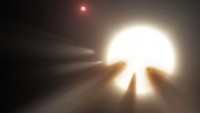Astronomers Meet to Finalize the ‘Square Kilometer Array,’ the World’s Largest Radio Telescope
| Arthur Dominic Villasanta | | Nov 09, 2016 08:32 AM EST |
(Photo : SKA Organization) An aerial view of the SKA dishes and MeerKAT dishes in South Africa (illustration).
A conference of astronomers and scientists that will support the world's largest radio telescope -- the Square Kilometer Array (SKA) -- is ongoing at Goa, India.
The SKA project's 2016 science conference, "Science for the SKA Generation," has drawn some 200 scientists to the week-long conference that focuses on bringing early career and senior researchers together to develop new collaborations and preview the science SKA will do in 2023 and beyond.
Like Us on Facebook
SKA is a large multi radio telescope project to be built in Australia and South Africa. When completed in 2023, SKA will have a total collecting area of one square kilometer.
It will operate over a wide range of frequencies and its size will make it 50 times more sensitive than any other radio instrument on Earth. More important, SKS will be able to survey the sky more than 10,000 times faster than ever before.
Engineering teams from around the world are currently finalizing the design of the telescope, while the international astronomy community prepares to use this next-generation facility.
The conference has brought together PhD students and postdoctoral researchers from the radio astronomy community to foster new collaborations for the SKA era.
"This week's meeting in Goa is an excellent opportunity to highlight results obtained with SKA pathfinder and precursor telescopes from around the world, as well as further advance the planning of our Key Science Projects," said Robert Braun, SKA Science Director.
"The next few years will see a wave of new results emerging from the suite of powerful radio telescopes such as FAST in China, GMRT in India, LOFAR in the Netherlands, MeerKAT and HERA in South Africa and MWA and ASKAP in Australia. Scientists who are using these facilities will become the first generation of users to make exciting discoveries with the SKA."
Key science projects are large observing campaigns focused on answering specific high priority objectives that will utilize a large fraction of the first five years of SKA operations.
Many areas of astrophysics will be covered throughout the week. These include the epoch of re-ionization and the study of the cosmic dawn (the first billion years of the universe); the distribution of hydrogen in the universe; the study of transient phenomena such as fast radio bursts; cosmic magnetism; monitoring the Sun's activity; mapping pulsars in our galaxy and the search for life in the universe.
The meeting is organized by the international SKA Organization with the local support of the National Centre for Radio Astrophysics (NCRA-TIFR) in Pune, India, which represents India in the SKA project.
TagsSquare Kilometer Array, SKA, Science for the SKA Generation, astronomers, Robert Braun, SKA Organization
©2015 Chinatopix All rights reserved. Do not reproduce without permission
 China’s FAST Space Telescope Officially Joins in the Hunt for Intelligent Extraterrestrial Civilizations
China’s FAST Space Telescope Officially Joins in the Hunt for Intelligent Extraterrestrial Civilizations Star with Orbiting ‘Alien Megastructure’ Continues to Baffle with New Evidence
Star with Orbiting ‘Alien Megastructure’ Continues to Baffle with New Evidence SETI Plods on in Search for ET despite Pessimism but Buoyed by $100 Million in Funding
SETI Plods on in Search for ET despite Pessimism but Buoyed by $100 Million in Funding ALMA Sets Standard for Measuring the Mass of Black Holes
ALMA Sets Standard for Measuring the Mass of Black Holes SETI Wants to Invite Aliens to Visit the Earth
SETI Wants to Invite Aliens to Visit the Earth
EDITOR'S PICKS
-

Did the Trump administration just announce plans for a trade war with ‘hostile’ China and Russia?
-

US Senate passes Taiwan travel bill slammed by China
-

As Yan Sihong’s family grieves, here are other Chinese students who went missing abroad. Some have never been found
-

Beijing blasts Western critics who ‘smear China’ with the term sharp power
-

China Envoy Seeks to Defuse Tensions With U.S. as a Trade War Brews
-

Singapore's Deputy PM Provides Bitcoin Vote of Confidence Amid China's Blanket Bans
-

China warns investors over risks in overseas virtual currency trading
-

Chinese government most trustworthy: survey
-

Kashima Antlers On Course For Back-To-Back Titles
MOST POPULAR
LATEST NEWS
Zhou Yongkang: China's Former Security Chief Sentenced to Life in Prison

China's former Chief of the Ministry of Public Security, Zhou Yongkang, has been given a life sentence after he was found guilty of abusing his office, bribery and deliberately ... Full Article
TRENDING STORY

China Pork Prices Expected to Stabilize As The Supplies Recover

Elephone P9000 Smartphone is now on Sale on Amazon India

There's a Big Chance Cliffhangers Won't Still Be Resolved When Grey's Anatomy Season 13 Returns

Supreme Court Ruled on Samsung vs Apple Dispute for Patent Infringement

Microsoft Surface Pro 5 Rumors and Release Date: What is the Latest?










